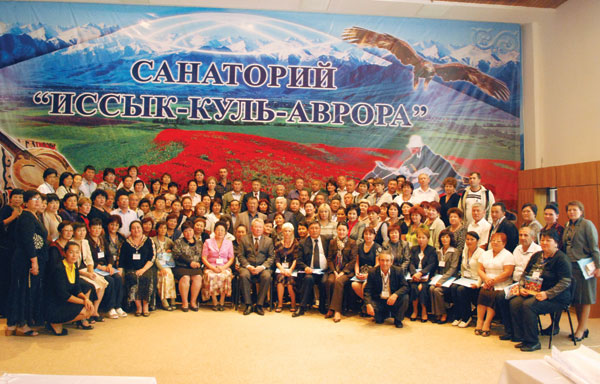KYRGYZSTAN:
Decisions Made in Isolation Cast Aside, Now Committees Fix Common GoalsNovember 29, 2011

Forging a future together.
For a long time in Kyrgyzstan a great many decisions affecting schools and education were made in isolation by a few. But now with support from USAID’s Quality Learning Project the decision making process about schools has become participatory, fully engaging the parental community, educators and local government.
The increased interest in supporting participatory and transparent methods for managing schools was evident when 150 individuals, including the Minister of Education, showed up to attend the second Forum of Advisory Committees. The Forum which took place on September 17 and 18 was held in Issyk-Kul in eastern Kyrgyzstan, an area lying on the former Silk Route and which historically provided a meeting place for many to barter, discuss, and mutually resolve the specifics of purchases and the selling of merchandise. In this spirit of coming together participants at the second Forum, which was organized by the Quality Learning Project, gathered for those two September days to negotiate and express their needs regarding building the capacity of their Advisory Committees. In turn these Committees bolstered by new commitments of assistance will be enabled to better serve their local schools. The Forum, like posts along the Silk Road, provided a venue for the exchange of ideas, in this case for resolving challenges.
By all accounts the second Forum was a lively affair and empowering for participants who ended the two days by drafting an appeal to government bodies, inspections bodies, mass media and the community to provide further support to the Advisory Committees activities so that they can improve partnerships between school and parents. This appeal signed by 114 individuals was given specifically to the Minister of Education, Sadykov Kanat, who also attended the Forum, and was also published in the Kyrgyz “Kut Bilim” newspaper.
“Schools always need the help of parents and sponsors to help maintain facilities and provide modern and advanced learning aids to teach children new things. Even the governments of developed countries cannot fully support schools,” said Abdykerimov Kuduretilla, Chairperson of Kara-Balta School #4’s Advisory Committee. “The Advisory Committee agreed that a good education for our children is an obligation of government, we also agreed that foremost education is a main obligation of every parent,” he added.
According to Kuduretilla, Kara-Balta #4 provided computer lessons to students though the school had no computers, a factor that led the school’s Advisory Committee members to take action. “The computer lessons provided were only with theoretical materials; it was impractical. So, how could our children get practical skills working with computers in such a situation? That is why our Advisory Committee decided to buy six computers for the school,” said Kuduretilla.
Kyrgyz Advisory Committees are public self-governed and voluntary associations established as a citizen initiative to foster community interest in local schools. Committee chairpersons are elected and those individuals who want to join must submit an application. Like any legitimate public association, the Committees are legal entities with bank accounts and work with schools through a cooperative agreement. Assistance to a school by an Advisory Committee can include such support as classroom repairs, providing access to education to low-income students and motivating teachers to improve their performance. Additionally, the Committees support students by providing some with a best student award.
Given ever tightening budgets, Advisory Committees are enlisting community support which can make a critical difference to a school. “At the present time 14 classes for talented children are provided at our school. As the result our children get prize-winning places in Olympiads for English, Geography and Biology…Overall, in the last year the quality of education in our school has improved from to 39% to 40%,” said Kohanov Genadiy, Chairperson of Nijne-Alarchinskaya School’s Advisory Committee. “Someone could say that this amount is too small, but behind this number there are 18 students who can compete with other high achievers.”
Since launching in 2007, USAID’s Quality Learning Project has provided assistance to the Committees to make them more strategic in their partnerships with schools. For QLP, this assistance to the Committees involves working with school principals and chairpersons to not only improve school infrastructure and quality of learning, but also making the school budget transparent. QLP has enabled the budget process to be demystified for schools, parents and communities which has empowered those concerned with schools to ask questions about spending and to suggest improvements. Along with providing technical know how to principals to improve balance sheets and school budgets, USAID’s QLP also assists the Advisory Committees with informational workshops and technical assistance in legal registration.
The boost given to the Advisory Committees by QLP has had an infectious effect on generating enthusiasm and good will towards improving Kyrgyzstan’s schools. This includes gaining the interest of public officials. The Minister of Education, Sadykov Kanat opened the Forum and welcomed all participants, which was comprised of 17 Advisory Committee representatives. Also in attendance were the deputies of Parliament, Karamushkina Irina and Osmonaliev Kanybek, who made welcoming speeches. As the Forum wound down, awards were distributed to the Committee members from the Ministry of Education and Science, an unexpected honor to the chairpersons who did not expect such attention from officials. In turn committee members thanked all for the confidence shown in them and promised to work better. “Today schools cannot survive without the help of the parental community. Given this very open and transparent process, parents should remain active in the budgeting of schools and support our teachers and school principals,” said Irina.
